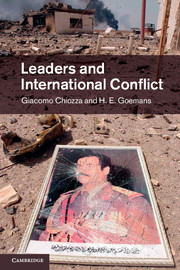Book contents
- Frontmatter
- Contents
- Tables
- Figures
- Acknowledgments
- Online appendices
- 1 Leaders
- 2 Why and when do leaders fight?
- 3 International conflict and the fate of leaders
- 4 The fate of leaders and incentives to fight
- 5 Case studies: Central America 1840???1918
- 6 Conclusions
- Appendix A Data and measurement
- Bibliography
- Index
6 - Conclusions
Published online by Cambridge University Press: 07 September 2011
- Frontmatter
- Contents
- Tables
- Figures
- Acknowledgments
- Online appendices
- 1 Leaders
- 2 Why and when do leaders fight?
- 3 International conflict and the fate of leaders
- 4 The fate of leaders and incentives to fight
- 5 Case studies: Central America 1840???1918
- 6 Conclusions
- Appendix A Data and measurement
- Bibliography
- Index
Summary
Summary
What did the late King Prajadhipok, the last absolute ruler of Siam (now Thailand), do to prepare himself financially for life after his anticipated overthrow in the early 1930s? He took out unemployment insurance with French and British insurance companies. Then, having failed to suppress the newly formed constitutional government, he accepted his ouster, collected on the policies and lived comfortably in England for the remaining six years of his life.
This book makes a simple point: leaders decide to initiate conflict at least partly on how conflict in turn affects not just the probability, but especially the manner of losing office. In particular, we argue that as the risk of a forcible removal increases, leaders become more likely to initiate international conflict. To establish this point, in Chapter 2 we developed a theoretical framework to explain which, when, and why leaders can obtain private benefits from international conflict. The answer, we argue, turns on leaders’ expectations about their personal fate out of office. In countries that have established norms, procedures, and institutions to protect leaders after they lose office, leaders can afford to lose office gracefully and participate in an institutionalized process of regular transfers of power. In countries that lack the institutions to protect leaders, they will be loath to turn over the reins of power, because that exposes them to significant personal punishments such as exile, imprisonment or death. The removal of such leaders then typically requires the threat or use of force.
- Type
- Chapter
- Information
- Leaders and International Conflict , pp. 195 - 204Publisher: Cambridge University PressPrint publication year: 2011



